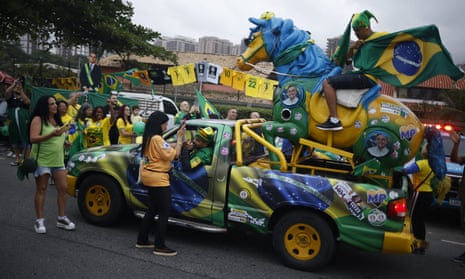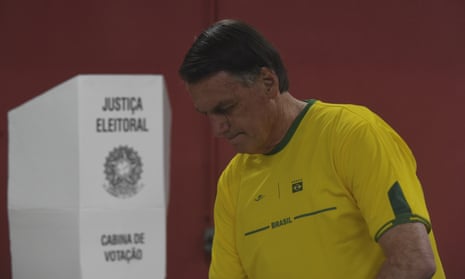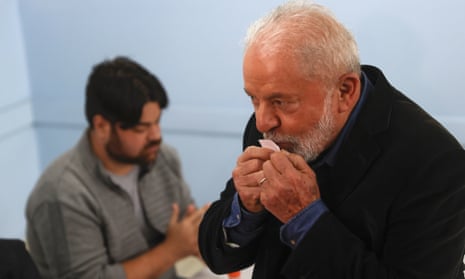Key events
The Associated Press spoke to voters on Sunday. Here is what a few of them had to say:
Fernanda Reznik, a 48-year-old health worker, wore a red T-shirt a color associated with da Silva’s Workers’ Party to vote in Copacabana, where pro-Bolsonaro demonstrators often congregate, and had been waiting in line for 40 minutes.
“I’ll wait three hours if I have to!” said Reznik, who no longer bothers talking politics with neighbours who favour Bolsonaro.
“This year the election is more important, because we already went through four years of Bolsonaro and today we can make a difference and give this country another direction.”

Marley Melo, a 53-year-old trader in capital Brasilia, sported the yellow of the Brazilian flag, which Bolsonaro and his supporters have coopted for demonstrations.
Melo said he is once again voting for Bolsonaro, who met his expectations, and he doesn’t believe the surveys that show him trailing.
“Polls can be manipulated. They all belong to companies with interests,” he said.

How are votes counted?
Despite the fact that Brazil is the world’s fourth-largest democracy, results from more than 150 million eligible voters are presented mere hours after polls close, thanks to the country’s electronic voting system. And no significant fraud has ever been detected, the AP reports.
Electronic machines were first used in 1996 and the first nationwide, electronic-only vote took place four years later.
Brazilian authorities adopted electronic voting machines to tackle longstanding fraud. In earlier elections, ballot boxes arrived at voting stations already stuffed with votes. Others were stolen and individual votes were routinely falsified, according to Brazil’s electoral authority.
A month ago, President Jair Bolsonaro was feeding concern about the nation’s electronic voting system. He has long insisted that the machines, used for a quarter-century, are prone to fraud, though he acknowledged last year that hasn’t been proved.
Brazil’s top electoral authority maintain the system has been tested rigorously.

Supporters and allies of Brazil’s ex-president Luiz Inácio Lula da Silva, are streaming into a hotel in downtown São Paulo hoping to celebrate a first round win in Brazil’s acrimonious presidential election.
Speaking to the Guardian as she arrived at the event, the president of Lula’s leftist Worker’s party (PT), said she was optimistic about their chances of returning to power and defeating the far-right incumbent Jair Bolsonaro.
“We feel confident ... we feel real happiness. We have faced hard and difficult moments but we have prevailed through our resistance and our unflinching belief in our cause,” Gleisi Hoffmann said.
Hoffman said Bolsonaro, an ally of Donald Trump, would fail if he tried to contest the result like his North American friend.
“[Bolsonaro] will have to respect the result. He isn’t bigger than Brazil or Brazil’s institutions,” she said.
Who is Jair Bolsonaro?
Since 2019, far-right incumbent Jair Bolsonaro has has led an administration marked by incendiary speech, his testing of democratic institutions, his widely criticised handling of the Covid-19 pandemic and the worst deforestation in the Amazon rainforest in 15 years.
But he has built a devoted base by defending conservative values, rebuffing political correctness and presenting himself as protecting the nation from leftist policies that he says infringe on personal liberties and produce economic turmoil.

Who is Lula?
Brazilian frontrunner Luiz Inácio Lula da Silva, known as Lula, became the country’s first working-class president in 2002.
Lula stepped down after two terms in 2010 with approval ratings close to 90%. But the following decade saw the Workers’ party (PT) he helped found embroiled in a tangle of corruption scandals and accused of plunging Brazil into a brutal recession.

His apparently irremediable downfall was cemented in 2018 when he was jailed on corruption charges and barred from running in that year’s election, which Bolsonaro went on to win. Lula’s 580-day imprisonment seemed a melancholy end to a fairytale life that saw him rise from rural poverty to become one of the world’s most popular leaders.
But Lula was freed in late 2019 and his convictions were quashed on the grounds that he was unfairly tried by Sérgio Moro, a rightwing judge who later took a job in Bolsonaro’s cabinet.
Lula, who first sought the presidency in 1989, announced his sixth presidential run in May, vowing to beat Bolsonaro by staging “the greatest peaceful revolution the world has ever seen”.
Voting closes in Brazil elections
Hello and welcome to our live coverage of the Brazilian elections. I’m Helen Sullivan, and I’ll be taking you through the results as they come in. Counting has already started and the result is likely to be called within the next 90 minutes or so.
Polls ahead of the election suggest that the country’s leftwing candidate Luiz Inácio Lula da Silva, who was president from 2003 to 2010 may secure an outright win – avoiding a second run-off.
One poll gave Lula 51% to Bolsonaro’s 37%, another gave them 50% and 36% respectively.


